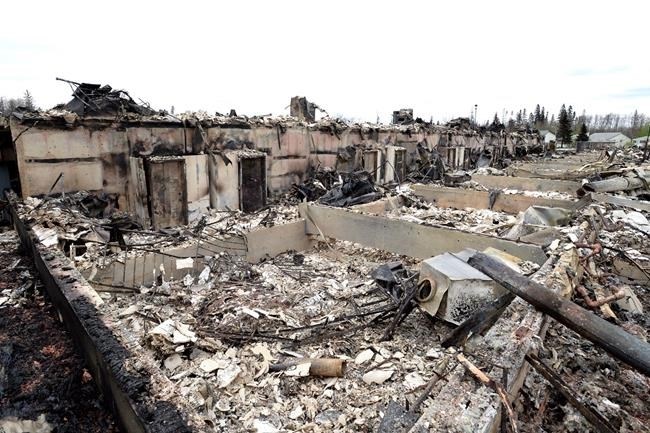
Burned out houses are shown in the Abasands neighbourhood during a media tour of the fire-damaged city of Fort McMurray, Alta. on Monday, May 9, 2016. The Fort McMurray wildfire in May 2016 destroyed almost 2,600 homes and resulted in many tales of hardship but Rob de Pruis says one man's "heart-breaking" story stands out for him.
Image Credit: THE CANADIAN PRESS/Jonathan Hayward
July 04, 2019 - 9:00 PM
CALGARY - The Fort McMurray wildfire in May 2016 destroyed almost 2,600 homes and resulted in many tales of hardship but Rob de Pruis says one man's "heart-breaking" story stands out for him.
The director of consumer and industry relations, western, for the Insurance Bureau of Canada, was stationed in the northern Alberta community for a year after the fire forced the temporary evacuation of more than 80,000 people.
At an event to help people with their insurance claims, a man who was nearing retirement age asked for advice, explaining his single-family home had burned to the ground.
"He said, 'Well, I just paid off my mortgage, my mortgage company did not require me to have property insurance anymore, so I cancelled my property insurance, thinking that was the right thing to do,'" de Pruis recalled.
The man was left with clear title to a residential lot full of charred debris. With no insurance, there was nothing the bureau could do.
"I heard a couple of years later that he sold the land and moved away to a community that was less costly for him," said de Pruis. "It was just a bad memory."
This spring's wildfires in northern Alberta, floods in Quebec, Ontario and New Brunswick and fears of a third year of unusually intense forest fires in B.C. serve as a reminder that disaster can strike at any time and in unexpected ways.
Catastrophic losses due to natural disasters have increased dramatically over the last decade in Canada, adding up to about $1.2 billion in 2017.
The highest insured property loss in a year was $5.0 billion in 2016, with $3.7 billion of that the result of the Fort McMurray wildfire which resulted in about 60,000 claims, the Insurance Bureau says.
In the year 2013, the second-highest losses of $3.2 billion were recorded, including $1.6 billion as a result of floods in southern Alberta that destroyed parts of downtown Calgary, and about $1 billion as a result of a summer storm and flooding in Toronto. A big winter storm that hit southern Ontario and parts of Eastern Canada also padded the total.
"People realize too late what their insurance policy covers," said de Pruis. "When they lose everything, they realize the limit they chose to cover their stuff may not be enough to purchase all of their stuff again."
Her level of insurance was the last thing on her mind as Jen Skinner, 37, and her husband and toddler son ran to their vehicle to escape the approaching Fort McMurray wildfire three years ago.
"The pieces of ash falling down were unreal, the size of my hand, and I ran in the house and told my husband, 'Get garbage bags, throw clothes in the bags and we're going,'" she said.
"We left so fast we had to pull over on the side of the highway to determine where we were going to go."
She said she was surprised the house was still standing when they returned but the siding was melted in places and the interior contaminated by smoke and toxins.
They wound up spending six months away from home and replacing almost every piece of furniture and every child's toy. Their insurance claim still hasn't been finalized but is expected to come in at more than $200,000.
As a mortgage broker, Skinner knew a lot about insuring property but her experience as a claimant taught her some new lessons.
"One thing I'd recommend is make sure you have everything in email, do not take anything verbal over the phone," she said, adding she dealt with six different insurance company claims adjusters.
"I had one adjuster tell me to throw away all of my kid's toys, anything that was plastic that might have absorbed the toxins, so I did that. And then the next adjuster said, 'No, we're going to clean this.'"
The Skinners had enough insurance to cover their expenses while their home was cleaned and repaired but she says many of her friends and neighbours ran out and had to pay their own way.
Another tip is to regularly take pictures or videos of the contents of the house because the insurance company will want a list of everything that needs to be replaced, she said.
Not all policyholders realize the difference between replacement cost and cash value insurance policies, de Pruis said. While choosing the latter will likely result in lower premiums, it could leave you short when replacing your property.
Most residential insurance policies provide coverage for fire damage, expenses in the event of a mandatory evacuation and compensation if a power outage damages appliances or their contents, he added.
Extra insurance should be considered for overland flooding — now available almost everywhere in Canada after being difficult to find five years ago — and sewer backup, along with special insurance for items such as jewelry, stamp or art collections.
Most Canadians have heard of the Fort McMurray wildfire but don't know about a flash flood a few months later that overwhelmed the sewer system and damaged homes in higher-elevation neighbourhoods, de Pruis said.
"Even if you don't live beside a lake or a river, you still could be subject to flooding," he warned.
Follow @HealingSlowly on Twitter.
News from © The Canadian Press, 2019